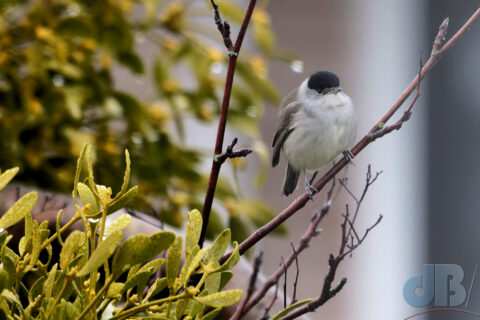TL:DR – The Blackcap, Sylvia atricapilla, is commonly a summer visitor to the UK from sub-Saharan Africa. But in recent years, some birds that spend their summers in the east of Europe and would normally head for the Iberian peninsula or North Africa in winter have reached the UK where they found winter food on bird feeders. There is now evidence that these birds that overwinter in the UK are not mingling with the Iberian or African overwinterers when they go back to their breeding grounds in east Europe.
UPDATE: As of 13th March 2023, the male Blackcap that overwintered since mid-December in our garden is still here. The outside temperature has gone from freezing to about 17 Celsius, but he is showing no signs of departing just yet. He enjoyed mistletoe berries, pyracanthus berries and now most of those have gone, he pecks at suet balls in a feeder right outside our living room window.
It’s no wonder this little fellow looks so grumpy perched next to the mistletoe growing on our rowan tree…most other Blackcaps will be enjoying a much balmier winter on the Iberian Peninsula or even in Africa. We have had Blackcaps in our garden in winter for several years now. Never see them in the garden in summer though. We had a male and a female last winter. So far this winter, just this solitary male.

In recent years, a lot of migrating Blackcaps (Sylvia atricapilla) have headed west from eastern Europe for the winter instead of turning south. Their compasses seem to have lost calibration, perhaps due to climate change, but other factors may be at play. The species seems to be affected by climate change, a decalibration of their internal compasses, and perhaps moreover by the British wont to stock garden bird feeders and put out fat balls, which is not such a common practice on the continental mainland.
When they head back to their mating grounds in the spring, they are marginalised by the southerners it seems and two distinct groupings are observed. This is an early process in speciation whereby in the long-term we might see a sub-species emerge that no longer mates with the other.